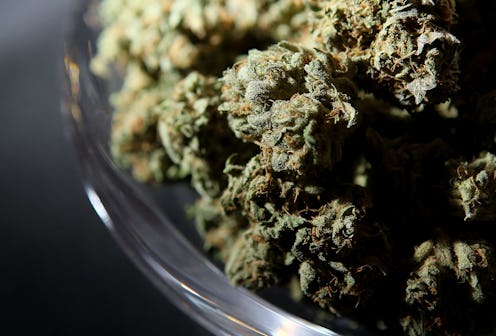News
America's Not the Only Country That Loves Weed
PSA: the Uruguay Senate has voted on a plan that could make it not only the first Latin American country to legalize weed — but the first national marijuana market in the world. "Approval late Tuesday was all but assured," the Associated Press reports. "For many of us, today is an historic day," said Constanza Moreira, an Uruguayan senator with the left-wing coalition Broad Front. "Many countries of Latin America, and many governments, will take this law as an example."
Under the new laws, here is what marijuana users and sellers in Uruguay would be allowed to do:
1. Citizens can buy 40g of cannabis
2. Marijuana social clubs can grow and distribute a maximum of 99 cannabis plants
3. The government can cultivate marijuana in the name of science and medicine
The War on Drugs has taken an unexpected but important step. This move comes hot on the heels of Denver City Council's decision yesterday to legalize the sale of marijuana to adults 21 and over starting Jan. 1, as well as allowing any kind of marijuana use on private property, even if it was in plain sight.
But what do Denver and Uruguay have to do with each other?
Let's broaden that a bit: What do U.S. and Uruguay marijuana laws have to do with each other? Everything. While the nations may be vastly different, let's not forget that the U.S. is heavily linked to Latin America because of the War on Drugs — which many have claimed has failed.
What effects will Uruguay's legalization have? And what effects will the U.S. have if it continues down the path that Denver has taken?
Here's what Al Jazeera America thinks:
The law would snatch the black market from drug traffickers, the drug war’s biggest profiteers. To do so, the government would sell higher-quality marijuana at a lower price: $1 per gram, as opposed to the $1.40 per gram for black-market marijuana that comes primarily from Paraguay. By doing do, Uruguay would tap into the marijuana black market, estimated at $40 million a year, and drastically reduce the $80 million the state spends annually to combat drugs.
Not only is this a practical solution for the government to cut spending, but the drug traffickers — who also account for a great deal of violence, though mostly in the cocaine trade — will take a huge financial hit. Thanks to legality, drug traffickers may start to lose relevance.
If they adopt similar policies, the same could happen for countries across Latin America who have been whittled down by the Drug Wars — Colombia, Venezuela, and Mexico, to name a few. And if the U.S. legalized marijuana, Mexican drug cartels — which have spurred the worst violence by far — would start to crumble.
So, let's cross our fingers that 2014 will be a very green year.
Images: Drug Policy Library, TheWinterb
